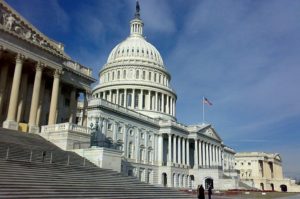Bitcoin Gambling Anonymity at Threat with New US Law?

According to new reports, the bill would see Homeland work with the US Customs and Border Protection (CBP) to devise a “strategy” for identifying digital currencies at border crossings, in simple words, but the bigger picture is that it could lead to a worse scenario – global Bitcoin control. Online gamblers from the US, much like those in other areas across the world that are also facing heavy restrictions, resolve to Bitcoin casinos as their only solution against regulatory oversight, but the new bill might change that in the future.
New Disclosure Provisions in US Bill S.1241
The bill, labeled S.1241, was reportedly drafted to help devise a way to prevent persons that enter the United States from smuggling large sums of money and assets in the form of Bitcoin and other cryptocurrencies. To do this, the DHS and CBP will be making an assessment of the needed infrastructure to execute the strategy and the findings would then have to be reported back to Congress after 18 months of the passing of the bill.
What this suggests, basically, is that a new strategy will be developed to intersect and discover digital currencies like Bitcoin at entry points in the States to prevent undeclared money entering the US. Per the current law, any traveler who enters the country is legally obliged to declare any amount higher than $10,000, but thus far there hasn’t been the need to do so in the case of cryptocurrencies.
However, the new bill carries provisions that would have digital currencies fall under the same legal requirements and thus make them subject to disclosure obligations with the CBP. The logic is that since digital currencies technically accompany travelers wherever they go, those who enter the United States will also be obliged to report them, if they possess a fund that exceeds the $10,000 threshold. Yet, this is not the case with holders of precious metals or bank accounts that surpass this line.
Is There a Real Threat?
The regulatory changes were introduced under the shroud of protecting the US from terrorism by eliminating anonymous funding through Bitcoin and similar currencies. However, Bitcoin advocates have strongly criticized the legislation by pointing out to the lack of significant evidence to support such claims. Thus far cryptocurrencies have only lead to very small amounts of money channeled to dangerous groups, according to research, while assets like oil were clearly found to be a leading source.
But the real concern here is what strategy and infrastructure will the US government develop under the new law? Apart from introducing stricter fines and tighter inspections at entry points, there are also suggestions that regulating foreign digital currency exchanges might be another solution for the problem, or even a global system that would monitor the blockchain ledgers. If any of the latter strategies are accepted, it could lead to the loss of Bitcoin’s decentralized nature and subsequently its anonymity.







